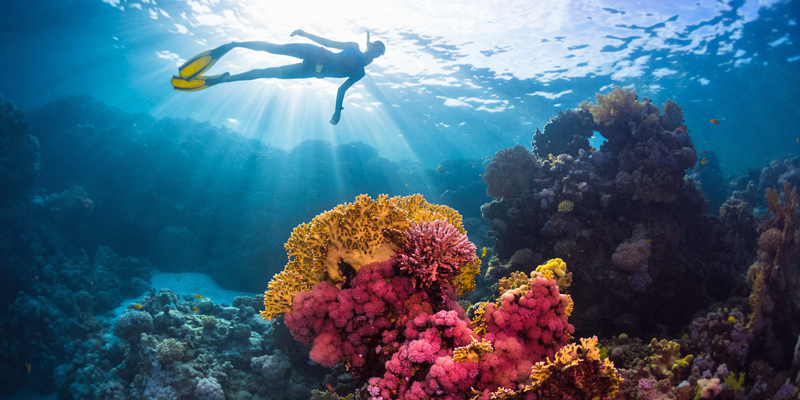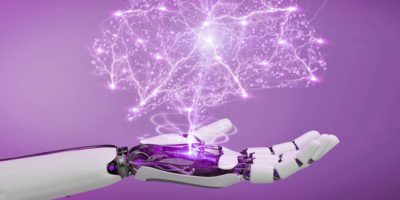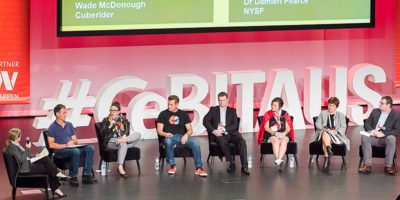Dr Sara Fowell is a research scientist in autonomous sensor development at the National Oceanography Centre in Southampton. Sara is an analytical chemist and her research specialisms are marine biogeochemistry, climate reconstruction, and microfluidic sensor development. In addition to working in labs, Sara also works on research ships, in remote tropical locations and under the sea, and she is also a highly experienced diver and scuba dive instructor.
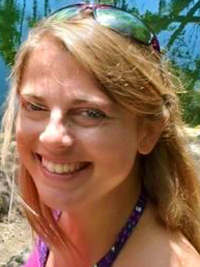
“By joining diverse groups of people you can bring the most effective solution to all manner of problems.”
From watching David Attenborough to scuba diving in Belize
I grew up in Staffordshire, almost as far from the sea as you can get! But I loved anything to do with the ocean and always looked forward to David Attenborough TV shows on Sunday evenings. I learnt to scuba dive at the age of 13 just because I wanted to get closer to marine life.
I originally thought I wanted to become a marine biologist, but as I moved through college, I realised that I found chemistry more fascinating. Therefore, I decided to do a Bachelor of Science in marine environmental science at the University of Portsmouth and carved a path towards chemical oceanography and pollution themed topics.
During my degree, we also had the opportunity to go on a field trip to Belize, Central America, to spend a week doing terrestrial ecology in the jungle, and a week doing tropical ecology at Tobacco Caye Marine Station. This was an opportunity not to be missed! I loved the fieldwork here so much, I decided to go back here for a couple of months after I had graduated. This was also the point of no return when it comes to my obsession with scuba diving!
Following this, I did a Master of Research (MRes) in ocean sciences at the University of Southampton. I preferred the idea of an MRes to a Master of Science (MSc) because it offered more time to sink my teeth into a research project. My dissertation involved characterising a novel microfluidic pH sensor using a pH-sensitive indicator dye (I basically got to make 80 shades of purple and orange liquid) and then testing it during a six-week-long research cruise in the Arctic Ocean.
After this, I embarked upon a PhD in coral geochemistry at the University of Southampton. Here, I used the elemental composition of coral skeletons to reconstruct a century-long record of sea surface temperature and pH in Belize. In the process, I got to do some epic fieldwork in Bermuda, coring corals and collecting water samples; and then learning lots of intricate clean lab techniques, and how to use cool analytical chemistry instruments such as the multicollector-inductively coupled plasma mass spectrometer (MC-ICP-MS).
After my PhD, I took some time out of academia and moved to Utila (Honduras) to train and work as a scuba diving instructor at the Utila Dive Centre before accepting a job as lead researcher at Marine Conservation Philippines.
Making sense of our changing seas
The final stop in my journey was in the Ocean Technology and Engineering Group at the National Oceanography Centre (NOC), Southampton. Here, I work as a research scientist in autonomous sensor development, where I mostly focus on optimising and developing sensors to measure ocean acidification (i.e. the same sensor I worked on years previously as a Master’s student, but obviously more advanced!). I like that my journey has encompassed reconstructing what the climate used to be, to observing it in real-time under the water, to working out how we can measure it better in the future.
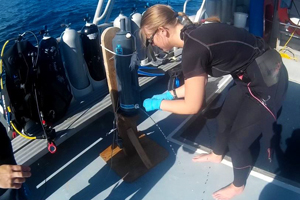
My daily routine really depends on what stage my project is at a given time. Generally, I can be found in the workshop or the chemistry lab calibrating and testing the novel microfluidic lab-on-chip pH sensors that we design, fabricate, and develop in house.
When I’m not in the lab, I’m usually at my desk either processing the test data or writing research grant applications so we can bring in more money to further develop our technology.
The favourite part of my job is my work with the Commonwealth Marine Economies Programme, where I work with government stakeholders in Small Island Developing States to provide them with Ocean Acidification Kits, train them to use and deploy the equipment, and how to process the data collected from the sensors.
Understanding and tackling the impact of climate change on coral reefs
Coral reefs are experiencing unprecedented rates of climate change, with ocean warming and ocean acidification putting a large amount of stress onto corals. Combined with activities such as coastal development, overfishing, and irresponsible tourism, the resilience of corals is being severely tested.
These stressors induce coral bleaching, spread disease, reduce the density of their skeletons, reduce diversity, and impact reproduction. Coral skeletons are basically a time machine. Corals can live for hundreds of years, and when they grow by precipitating calcium carbonate skeletons, they also incorporate lots of other elements such as strontium or boron which we can use to determine what the temperature or pH of the seawater was at the time that particular piece of a skeleton formed.
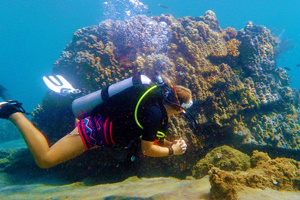
Making these comparisons through time helps us to understand how corals have responded to recent climate change, enabling us to make more accurate predictions of how they will respond to the levels of climate change that are predicted. Especially when we can also simulate these conditions in aquariums.
The ocean is being affected by climate change, but the rate and intensity of the change in coastal waters are greater than in open waters. Similarly, not all coral reefs have the same response to the change in conditions, and this complicates predicting the future health and response of coral reef ecosystems – they are all pretty unique.
We need to be able to measure the seawater conditions at a high resolution for a sustained period of time in terms of both time and space. Deploying autonomous sensors is the best way to do this.
Doing my bit and putting power in the hands of local people
My job now involves capacity building for Small Island Developing States to observe local trends in ocean acidification over a long period of time. Through a Commonwealth Marine Economies Programme project, we build and donate ocean acidification kits which consist of a pH sensor; a temperature, conductivity, and dissolved oxygen sensor; and a telemetry transceiver.
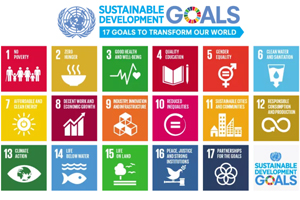
The data can also be used to inform local legislation, policy, and education. The more observational platforms we can deploy, the more we can understand and mitigate the impact of climate change on coral reef ecosystems.
All is not lost
Unfortunately, COVID-19 has severely impacted my work this year. Over the course of this financial year, we expected to deliver new ocean acidification kits, repair existing kits, and conduct scoping visits to additional countries around the Caribbean and South Pacific.
Obviously, it has not been possible to travel, and additionally, a large chunk of our funding was redirected to fighting coronavirus.
All was not lost however, as we are sending upgraded equipment to our stakeholders in Belize and Dominica, and we are hosting a Caribbean-wide online workshop to advance their knowledge in ocean acidification science and equipment repair and maintenance.
Diverse teams are key for successful research
Having a diverse team is one of the most important factors of a successful research project. Everybody matters. In my project, for example, we need:
- Engineers to design and build the hardware;
- Chemists to optimise the chemical reaction in the sensors;
- Logistics experts to help us transport equipment to remote corners of the world;
- Data scientists to analyse the data;
- Local government stakeholders to deploy and use the equipment in a way that benefits them the most;
- Scuba divers to deploy the equipment.
By joining diverse groups of people you can bring the most effective solution to all manner of problems. Working in a diverse team is one of the favourite parts of my job.
Your ability and passions are NOT defined by your gender
My advice to girls and women getting into science is, do what you enjoy, and don’t let people say you can’t do something. Your ability and your passions are not defined by your gender.
Honestly, if you like something, just do it, and see where it leads you! If you know you enjoy science but you can’t quite pin down something in particular, don’t worry about it, try a bit of everything, take a range of subjects at school and university, and dedicate time reading around subjects.
The ocean is calling me…
I have never been one to make plans very far in advance! I genuinely do just follow what I enjoy, make most of the opportunities that arise, and of course create my own opportunities if there is something I really want to do!
For work, I am working on making the technology more accessible to citizen scientists so we can increase our data resolution and get people more actively involved in monitoring ocean acidification. But what I’m looking forward to most of all right now is jumping on a plane and going on some insane cave dives, tech, wreck, reef dives… It has been one long, DRY year!
https://www.linkedin.com/in/sara-fowell-9b050a90

